
The homepage of Stark Industries Solutions.
Two weeks before Russia invaded Ukraine in February 2022, a large, mysterious new Internet hosting firm called Stark Industries Solutions materialized and quickly became the epicenter of massive distributed denial-of-service (DDoS) attacks on government and commercial targets in Ukraine and Europe. An investigation into Stark Industries reveals it is being used as a global proxy network that conceals the true source of cyberattacks and disinformation campaigns against enemies of Russia.
At least a dozen patriotic Russian hacking groups have been launching DDoS attacks since the start of the war at a variety of targets seen as opposed to Moscow. But by all accounts, few attacks from those gangs have come close to the amount of firepower wielded by a pro-Russia group calling itself “NoName057(16).”
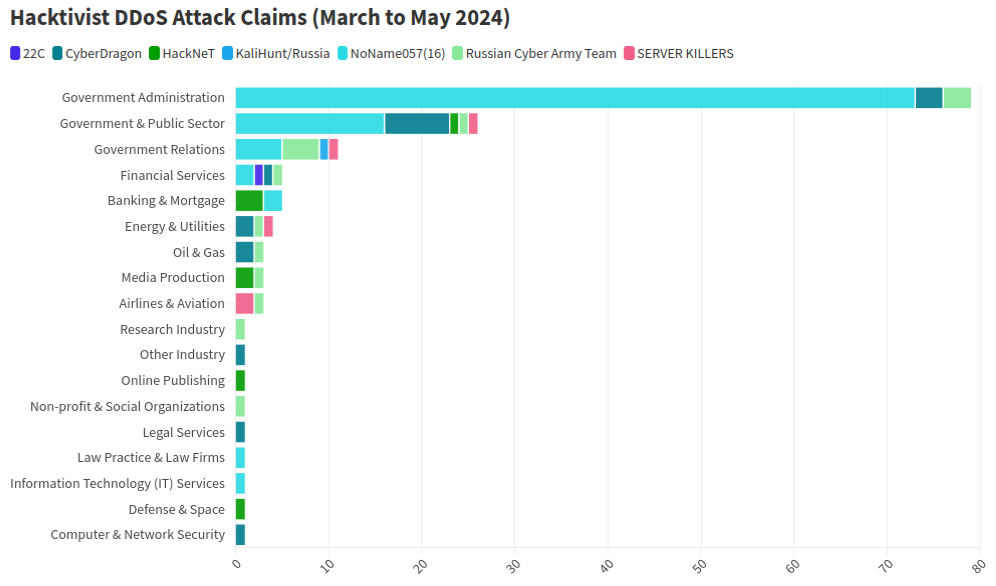
This graphic comes from a recent report from NETSCOUT about DDoS attacks from Russian hacktivist groups.
As detailed by researchers at Radware, NoName has effectively gamified DDoS attacks, recruiting hacktivists via its Telegram channel and offering to pay people who agree to install a piece of software called DDoSia. That program allows NoName to commandeer the host computers and their Internet connections in coordinated DDoS campaigns, and DDoSia users with the most attacks can win cash prizes.

The NoName DDoS group advertising on Telegram. Image: SentinelOne.com.
A report from the security firm Team Cymru found the DDoS attack infrastructure used in NoName campaigns is assigned to two interlinked hosting providers: MIRhosting and Stark Industries. MIRhosting is a hosting provider founded in The Netherlands in 2004. But Stark Industries Solutions Ltd was incorporated on February 10, 2022, just two weeks before the Russian invasion of Ukraine.
Security experts say that not long after the war started, Stark began hosting dozens of proxy services and free virtual private networking (VPN) services, which are designed to help users shield their Internet usage and location from prying eyes.
Proxy providers allow users to route their Internet and Web browsing traffic through someone else’s computer. From a website’s perspective, the traffic from a proxy network user appears to originate from the rented IP address, not from the proxy service customer.

These services can be used in a legitimate manner for several business purposes — such as price comparisons or sales intelligence — but they are also massively abused for hiding cybercrime activity because they can make it difficult to trace malicious traffic to its original source.
What’s more, many proxy services do not disclose how they obtain access to the proxies they are renting out, and in many cases the access is obtained through the dissemination of malicious software that turns the infected system into a traffic relay — usually unbeknownst to the legitimate owner of the Internet connection. Other proxy services will allow users to make money by renting out their Internet connection to anyone.
Spur.us is a company that tracks VPNs and proxy services worldwide. Spur finds that Stark Industries (AS44477) currently is home to at least 74 VPN services, and 40 different proxy services. As we’ll see in the final section of this story, just one of those proxy networks has over a million Internet addresses available for rent across the globe.
Raymond Dijkxhoorn operates a hosting firm in The Netherlands called Prolocation. He also co-runs SURBL, an anti-abuse service that flags domains and Internet address ranges that are strongly associated with spam and cybercrime activity, including DDoS.
Dijkxhoorn said last year SURBL heard from multiple people who said they operated VPN services whose web resources were included in SURBL’s block lists.
“We had people doing delistings at SURBL for domain names that were suspended by the registrars,” Dijkhoorn told KrebsOnSecurity. “And at least two of them explained that Stark offered them free VPN services that they were reselling.”
Dijkxhoorn added that Stark Industries also sponsored activist groups from Ukraine.
“How valuable would it be for Russia to know the real IPs from Ukraine’s tech warriors?” he observed.
Richard Hummel is threat intelligence lead at NETSCOUT. Hummel said when he considers the worst of all the hosting providers out there today, Stark Industries is consistently near or at the top of that list.
“The reason is we’ve had at least a dozen service providers come to us saying, ‘There’s this network out there inundating us with traffic,'” Hummel said. “And it wasn’t even DDoS attacks. [The systems] on Stark were just scanning these providers so fast it was crashing some of their services.”
Hummel said NoName will typically launch their attacks using a mix of resources rented from major, legitimate cloud services, and those from so-called “bulletproof” hosting providers like Stark. Bulletproof providers are so named when they earn or cultivate a reputation for ignoring any abuse complaints or police reports about activity on their networks.
Combining bulletproof providers with legitimate cloud hosting, Hummel said, likely makes NoName’s DDoS campaigns more resilient because many network operators will hesitate to be too aggressive in blocking Internet addresses associated with the major cloud services.
“What we typically see here is a distribution of cloud hosting providers and bulletproof hosting providers in DDoS attacks,” he said. “They’re using public cloud hosting providers because a lot of times that’s your first layer of network defense, and because [many companies are wary of] over-blocking access to legitimate cloud resources.”
But even if the cloud provider detects abuse coming from the customer, the provider is probably not going to shut the customer down immediately, Hummel said.
“There is usually a grace period, and even if that’s only an hour or two, you can still launch a large number of attacks in that time,” he said. “And then they just keep coming back and opening new cloud accounts.”
Stark Industries is incorporated at a mail drop address in the United Kingdom. UK business records list an Ivan Vladimirovich Neculiti as the company’s secretary. Mr. Neculiti also is named as the CEO and founder of PQ Hosting Plus S.R.L. (aka Perfect Quality Hosting), a Moldovan company formed in 2019 that lists the same UK mail drop address as Stark Industries.

Ivan Neculiti, as pictured on LinkedIn.
Reached via LinkedIn, Mr. Neculiti said PQ Hosting established Stark Industries as a “white label” of its brand so that “resellers could distribute our services using our IP addresses and their clients would not have any affairs with PQ Hosting.”
“PQ Hosting is a company with over 1,000+ of [our] own physical servers in 38 countries and we have over 100,000 clients,” he said. “Though we are not as large as Hetzner, Amazon and OVH, nevertheless we are a fast growing company that provides services to tens of thousands of private customers and legal entities.”
Asked about the constant stream of DDoS attacks whose origins have traced back to Stark Industries over the past two years, Neculiti maintained Stark hasn’t received any official abuse reports about attacks coming from its networks.
“It was probably some kind of clever attack that we did not see, I do not rule out this fact, because we have a very large number of clients and our Internet channels are quite large,” he said. “But, in this situation, unfortunately, no one contacted us to report that there was an attack from our addresses; if someone had contacted us, we would have definitely blocked the network data.”
DomainTools.com finds Ivan V. Neculiti was the owner of war[.]md, a website launched in 2008 that chronicled the history of a 1990 armed conflict in Moldova known as the Transnistria War and the Moldo-Russian war.

An ad for war.md, circa 2009.
Transnistria is a breakaway pro-Russian region that declared itself a state in 1990, although it is not internationally recognized. The copyright on that website credits the “MercenarieS TeaM,” which was at one time a Moldovan IT firm. Mr. Neculiti confirmed personally registering this domain.
The data breach tracking service Constella Intelligence reports that an Ivan V. Neculiti registered multiple online accounts under the email address dfyz_bk@bk.ru. Cyber intelligence firm Intel 471 shows this email address is tied to the username “dfyz” on more than a half-dozen Russian language cybercrime forums since 2008. The user dfyz on Searchengines[.]ru in 2008 asked other forum members to review war.md, and said they were part of the MercenarieS TeaM.
Back then, dfyz was selling “bulletproof servers for any purpose,” meaning the hosting company would willfully ignore abuse complaints or police inquiries about the activity of its customers.
DomainTools reports there are at least 33 domain names registered to dfyz_bk@bk.ru. Several of these domains have Ivan Neculiti in their registration records, including tracker-free[.]cn, which was registered to an Ivan Neculiti at dfyz_bk@bk.ru and referenced the MercenarieS TeaM in its original registration records.
Dfyz also used the nickname DonChicho, who likewise sold bulletproof hosting services and access to hacked Internet servers. In 2014, a prominent member of the Russian language cybercrime community Antichat filed a complaint against DonChicho, saying this user scammed them and had used the email address dfyz_bk@bk.ru.
The complaint said DonChicho registered on Antichat from the Transnistria Internet address 84.234.55[.]29. Searching this address in Constella reveals it has been used to register just five accounts online that have been created over the years, including one at ask.ru, where the user registered with the email address neculitzy1@yandex.ru. Constella also returns for that email address a user by the name “Ivan” at memoraleak.com and 000webhost.com.
Constella finds that the password most frequently used by the email address dfyz_bk@bk.ru was “filecast,” and that there are more than 90 email addresses associated with this password. Among them are roughly two dozen addresses with the name “Neculiti” in them, as well as the address support@donservers[.]ru.
Intel 471 says DonChicho posted to several Russian cybercrime forums that support@donservers[.]ru was his address, and that he logged into cybercrime forums almost exclusively from Internet addresses in Tiraspol, the capital of Transnistria. A review of DonChicho’s posts shows this person was banned from several forums in 2014 for scamming other users.
Cached copies of DonChicho’s vanity domain (donchicho[.]ru) show that in 2009 he was a spammer who peddled knockoff prescription drugs via Rx-Promotion, once one of the largest pharmacy spam moneymaking programs for Russian-speaking affiliates.
Mr. Neculiti told KrebsOnSecurity he has never used the nickname DonChicho.
“I may assure you that I have no relation to DonChicho nor to his bulletproof servers,” he said.
Below is a mind map that shows the connections between the accounts mentioned above.
Earlier this year, NoName began massively hitting government and industry websites in Moldova. A new report from Arbor Networks says the attacks began around March 6, when NoName alleged the government of Moldova was “craving for Russophobia.”
“Since early March, more than 50 websites have been targeted, according to posted ‘proof’ by the groups involved in attacking the country,” Arbor’s ASERT Team wrote. “While NoName seemingly initiated the ramp of attacks, a host of other DDoS hacktivists have joined the fray in claiming credit for attacks across more than 15 industries.”
The German independent news outlet Correctiv.org last week published a scathing investigative report on Stark Industries and MIRhosting, which notes that Ivan Neculiti operates his hosting companies with the help of his brother, Yuri.
The report points out that Stark Industries continues to host a Russian disinformation news outlet called “Recent Reliable News” (RRN) that was sanctioned by the European Union in 2023 for spreading links to propaganda blogs and fake European media and government websites.
“The website was not running on computers in Moscow or St. Petersburg until recently, but in the middle of the EU, in the Netherlands, on the computers of the Neculiti brothers,” Correctiv reporters wrote.
“After a request from this editorial team, a well-known service was installed that hides the actual web host,” the report continues. “Ivan Neculiti announced that he had blocked the associated access and server following internal investigations. “We very much regret that we are only now finding out that one of our customers is a sanctioned portal,” said the company boss. However, RRN is still accessible via its servers.”
Correctiv also points to a January 2023 report from the Ukrainian government, which found servers from Stark Industries Solutions were used as part of a cyber attack on the Ukrainian news agency “Ukrinform”. Correctiv notes the notorious hacker group Sandworm — an advanced persistent threat (APT) group operated by a cyberwarfare unit of Russia’s military intelligence service — was identified by Ukrainian government authorities as responsible for that attack.
Public records indicate MIRhosting is based in The Netherlands and is operated by 37-year old Andrey Nesterenko, whose personal website says he is an accomplished concert pianist who began performing publicly at a young age.
DomainTools says mirhosting[.]com is registered to Mr. Nesterenko and to Innovation IT Solutions Corp, which lists addresses in London and in Nesterenko’s stated hometown of Nizhny Novgorod, Russia.
This is interesting because according to the book Inside Cyber Warfare by Jeffrey Carr, Innovation IT Solutions Corp. was responsible for hosting StopGeorgia[.]ru, a hacktivist website for organizing cyberattacks against Georgia that appeared at the same time Russian forces invaded the former Soviet nation in 2008. That conflict was thought to be the first war ever fought in which a notable cyberattack and an actual military engagement happened simultaneously.
Responding to questions from KrebsOnSecurity, Mr. Nesterenko said he couldn’t say whether his network had ever hosted the StopGeorgia website back in 2008 because his company didn’t keep records going back that far. But he said Stark Industries Solutions is indeed one of MIRhsoting’s colocation customers.
“Our relationship is purely provider-customer,” Nesterenko said. “They also utilize multiple providers and data centers globally, so connecting them directly to MIRhosting overlooks their broader network.”
“We take any report of malicious activity seriously and are always open to information that can help us identify and prevent misuse of our infrastructure, whether involving Stark Industries or any other customer,” Nesterenko continued. “In cases where our services are exploited for malicious purposes, we collaborate fully with Dutch cyber police and other relevant authorities to investigate and take appropriate measures. However, we have yet to receive any actionable information beyond the article itself, which has not provided us with sufficient detail to identify or block malicious actors.”
In December 2022, security firm Recorded Future profiled the phishing and credential harvesting infrastructure used for Russia-aligned espionage operations by a group dubbed Blue Charlie (aka TAG-53), which has targeted email accounts of nongovernmental organizations and think tanks, journalists, and government and defense officials.
Recorded Future found that virtually all the Blue Charlie domains existed in just ten different ISPs, with a significant concentration located in two networks, one of which was MIRhosting. Both Microsoft and the UK government assess that Blue Charlie is linked to the Russian threat activity groups variously known as Callisto Group, COLDRIVER, and SEABORGIUM.
Mr. Nesterenko took exception to a story on that report from The Record, which is owned by Recorded Future.
“We’ve discussed its contents with our customer, Stark Industries,” he said. “We understand that they have initiated legal proceedings against the website in question, as they firmly believe that the claims made are inaccurate.”
Recorded Future said they updated their story with comments from Mr. Neculiti, but that they stand by their reporting.
Mr. Nesterenko’s LinkedIn profile says he was previously the foreign region sales manager at Serverius-as, a hosting company in The Netherlands that remains in the same data center as MIRhosting.
In February, the Dutch police took 13 servers offline that were used by the infamous LockBit ransomware group, which had originally bragged on its darknet website that its home base was in The Netherlands. Sources tell KrebsOnSecurity the servers seized by the Dutch police were located in Serverius’ data center in Dronten, which is also shared by MIRhosting.
Serverius-as did not respond to requests for comment. Nesterenko said MIRhosting does use one of Serverius’s data centers for its operations in the Netherlands, alongside two other data centers, but that the recent incident involving the seizure of servers has no connection to MIRhosting.
“We are legally prohibited by Dutch law and police regulations from sharing information with third parties regarding any communications we may have had,” he said.
A February 2024 report from security firm ESET found Serverius-as systems were involved in a series of targeted phishing attacks by Russia-aligned groups against Ukrainian entities throughout 2023. ESET observed that after the spearphishing domains were no longer active, they were converted to promoting rogue Internet pharmacy websites.
A review of the Internet address ranges recently added to the network operated by Stark Industries Solutions offers some insight into its customer base, usage, and maybe even true origins. Here is a snapshot (PDF) of all Internet address ranges announced by Stark Industries so far in the month of May 2024 (this information was graciously collated by the network observability platform Kentik.com).
Those records indicate that the largest portion of the IP space used by Stark is in The Netherlands, followed by Germany and the United States. Stark says it is connected to roughly 4,600 Internet addresses that currently list their ownership as Comcast Cable Communications.
A review of those address ranges at spur.us shows all of them are connected to an entity called Proxyline, which is a sprawling proxy service based in Russia that currently says it has more than 1.6 million proxies globally that are available for rent.
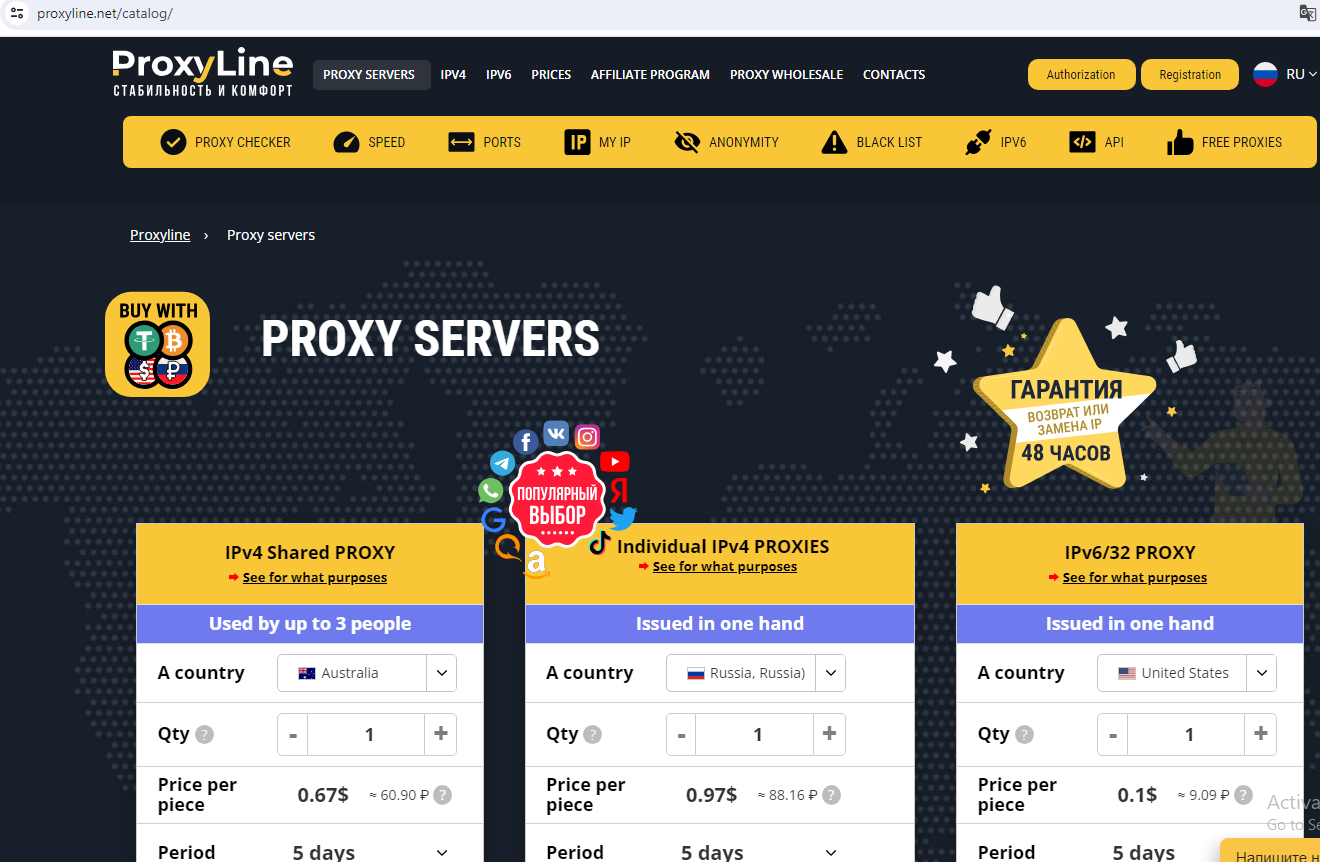
Proxyline dot net.
Reached for comment, Comcast said the Internet address ranges never did belong to Comcast, so it is likely that Stark has been fudging the real location of its routing announcements in some cases.
Stark reports that it has more than 67,000 Internet addresses at Santa Clara, Calif.-based EGIhosting. Spur says the Stark addresses involving EGIhosting all map to Proxyline as well. EGIhosting did not respond to requests for comment.
EGIhosting manages Internet addresses for the Cyprus-based hosting firm ITHOSTLINE LTD (aka HOSTLINE-LTD), which is represented throughout Stark’s announced Internet ranges. Stark says it has more than 21,000 Internet addresses with HOSTLINE. Spur.us finds Proxyline addresses are especially concentrated in the Stark ranges labeled ITHOSTLINE LTD, HOSTLINE-LTD, and Proline IT.
Stark’s network list includes approximately 21,000 Internet addresses at Hockessin, De. based DediPath, which abruptly ceased operations without warning in August 2023. According to a phishing report released last year by Interisle Consulting, DediPath was the fourth most common source of phishing attacks in the year ending Oct. 2022. Spur.us likewise finds that virtually all of the Stark address ranges marked “DediPath LLC” are tied to Proxyline.
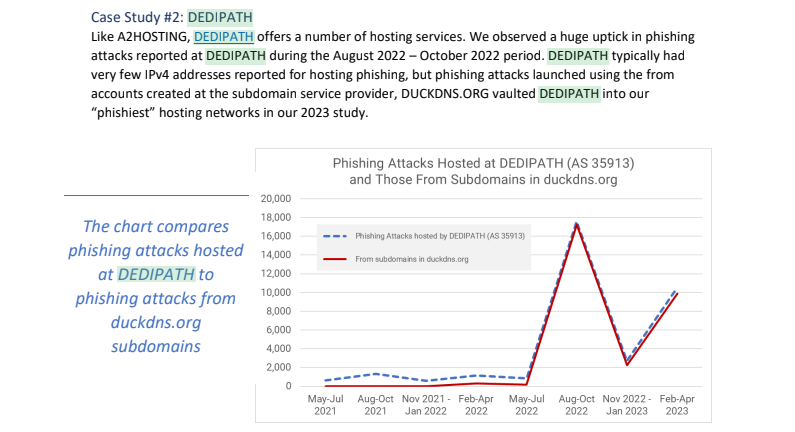
Image: Interisle Consulting.
A large number of the Internet address ranges announced by Stark in May originate in India, and the names that are self-assigned to many of these networks indicate they were previously used to send large volumes of spam for herbal medicinal products, with names like HerbalFarm, AdsChrome, Nutravo, Herbzoot and Herbalve.
The anti-spam organization SpamHaus reports that many of the Indian IP address ranges are associated with known “snowshoe spam,” a form of abuse that involves mass email campaigns spread across several domains and IP addresses to weaken reputation metrics and avoid spam filters.
It’s not clear how much of Stark’s network address space traces its origins to Russia, but big chunks of it recently belonged to some of the oldest entities on the Russian Internet (a.k.a. “Runet”).
For example, many Stark address ranges were most recently assigned to a Russian government entity whose full name is the “Federal State Autonomous Educational Establishment of Additional Professional Education Center of Realization of State Educational Policy and Informational Technologies.”
A review of Internet address ranges adjacent to this entity reveals a long list of Russian government organizations that are part of the Federal Guard Service of the Russian Federation. Wikipedia says the Federal Guard Service is a Russian federal government agency concerned with tasks related to protection of several high-ranking state officials, including the President of Russia, as well as certain federal properties. The agency traces its origins to the USSR’s Ninth Directorate of the KGB, and later the presidential security service.
Stark recently announced the address range 213.159.64.0/20 from April 27 to May 1, and this range was previously assigned to an ancient ISP in St. Petersburg, RU called the Computer Technologies Institute Ltd.
According to a post on the Russian language webmaster forum searchengines[.]ru, the domain for Computer Technologies Institute — ctinet[.]ru — is the seventh-oldest domain in the entire history of the Runet.
Curiously, Stark also lists large tracts of Internet addresses (close to 48,000 in total) assigned to a small ISP in Kharkiv, Ukraine called NetAssist. Reached via email, the CEO of NetAssist Max Tulyev confirmed his company provides a number of services to PQ Hosting.
“We colocate their equipment in Warsaw, Madrid, Sofia and Thessaloniki, provide them IP transit and IPv4 addresses,” Tulyev said. “For their size, we receive relatively low number of complains to their networks. I never seen anything about their pro-Russian activity or support of Russian hackers. It is very interesting for me to see proofs of your accusations.”
Spur.us mapped the entire infrastructure of Proxyline, and found more than one million proxies across multiple providers, but by far the biggest concentration was at Stark Industries Solutions. The full list of Proxyline address ranges (.CSV) shows two other ISPs appear repeatedly throughout the list. One is Kharkiv, Ukraine based ITL LLC, also known as Information Technology Laboratories Group, and Integrated Technologies Laboratory.
The second is a related hosting company in Miami, called Green Floid LLC. Green Floid featured in a 2017 scoop by CNN, which profiled the company’s owner and quizzed him about Russian troll farms using proxy networks on Green Floid and its parent firm ITL to mask disinformation efforts tied to the Kremlin’s Internet Research Agency (IRA). At the time, the IRA was using Facebook and other social media networks to spread videos showing police brutality against African Americans in an effort to encourage protests across the United States.
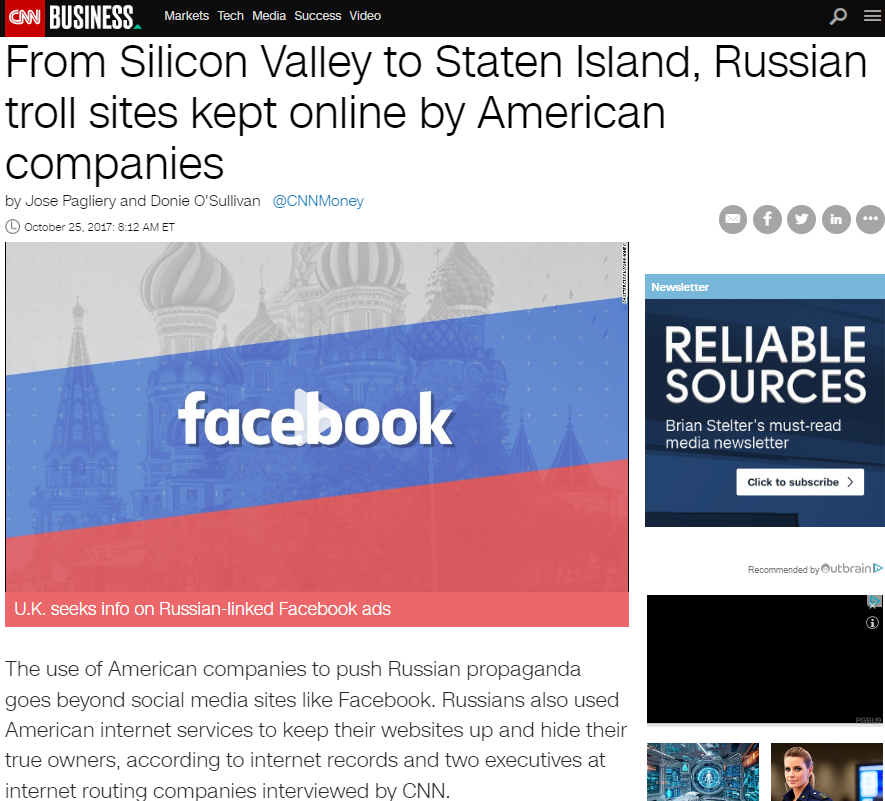
Doug Madory, director of Internet analysis at Kentik, was able to see at a high level the top sources and destinations for traffic traversing Stark’s network.
“Based on our aggregate NetFlow, we see Iran as the top destination (35.1%) for traffic emanating from Stark (AS44477),” Madory said. “Specifically, the top destination is MTN Irancell, while the top source is Facebook. This data supports the theory that AS44477 houses proxy services as Facebook is blocked in Iran.”
On April 30, the security firm Malwarebytes explored an extensive malware operation that targets corporate Internet users with malicious ads. Among the sites used as lures in that campaign were fake Wall Street Journal and CNN websites that told visitors they were required to install a WSJ or CNN-branded browser extension (malware). Malwarebytes found a domain name central to that operation was hosted at Internet addresses owned by Stark Industries.
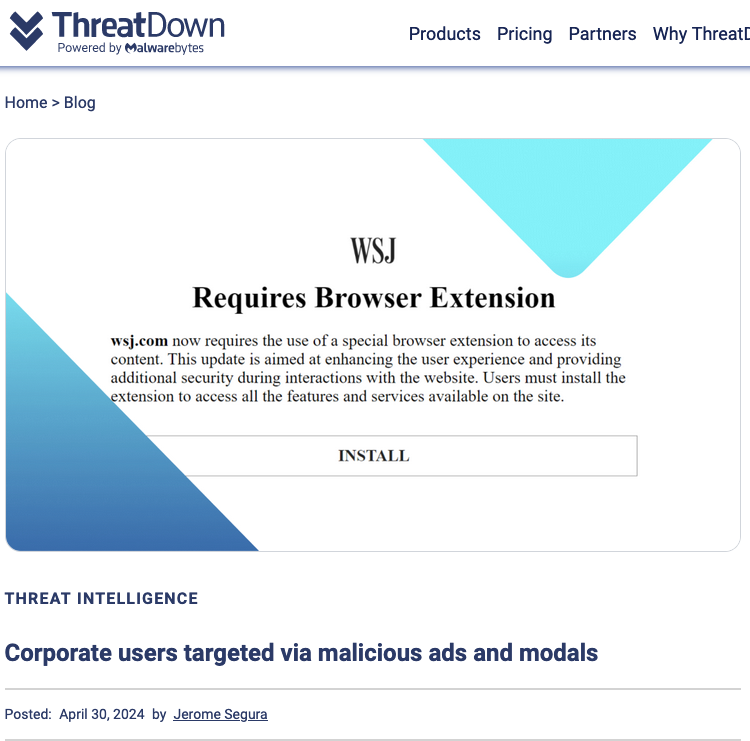
Image: threatdown.com
A cybercrook who has been setting up websites that mimic the self-destructing message service privnote.com accidentally exposed the breadth of their operations recently when they threatened to sue a software company. The disclosure revealed a profitable network of phishing sites that behave and look like the real Privnote, except that any messages containing cryptocurrency addresses will be automatically altered to include a different payment address controlled by the scammers.
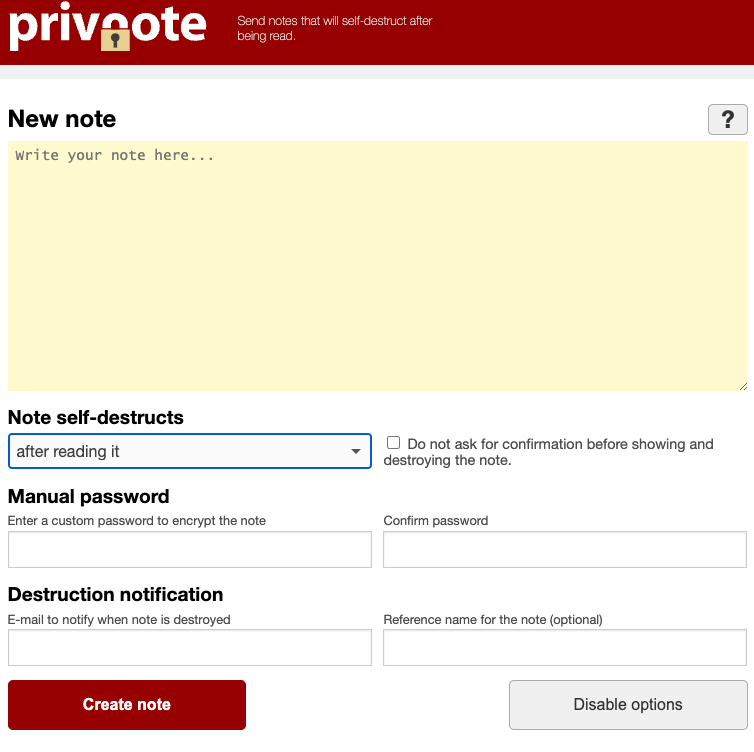
The real Privnote, at privnote.com.
Launched in 2008, privnote.com employs technology that encrypts each message so that even Privnote itself cannot read its contents. And it doesn’t send or receive messages. Creating a message merely generates a link. When that link is clicked or visited, the service warns that the message will be gone forever after it is read.
Privnote’s ease-of-use and popularity among cryptocurrency enthusiasts has made it a perennial target of phishers, who erect Privnote clones that function more or less as advertised but also quietly inject their own cryptocurrency payment addresses when a note is created that contains crypto wallets.
Last month, a new user on GitHub named fory66399 lodged a complaint on the “issues” page for MetaMask, a software cryptocurrency wallet used to interact with the Ethereum blockchain. Fory66399 insisted that their website — privnote[.]co — was being wrongly flagged by MetaMask’s “eth-phishing-detect” list as malicious.
“We filed a lawsuit with a lawyer for dishonestly adding a site to the block list, damaging reputation, as well as ignoring the moderation department and ignoring answers!” fory66399 threatened. “Provide evidence or I will demand compensation!”
MetaMask’s lead product manager Taylor Monahan replied by posting several screenshots of privnote[.]co showing the site did indeed swap out any cryptocurrency addresses.
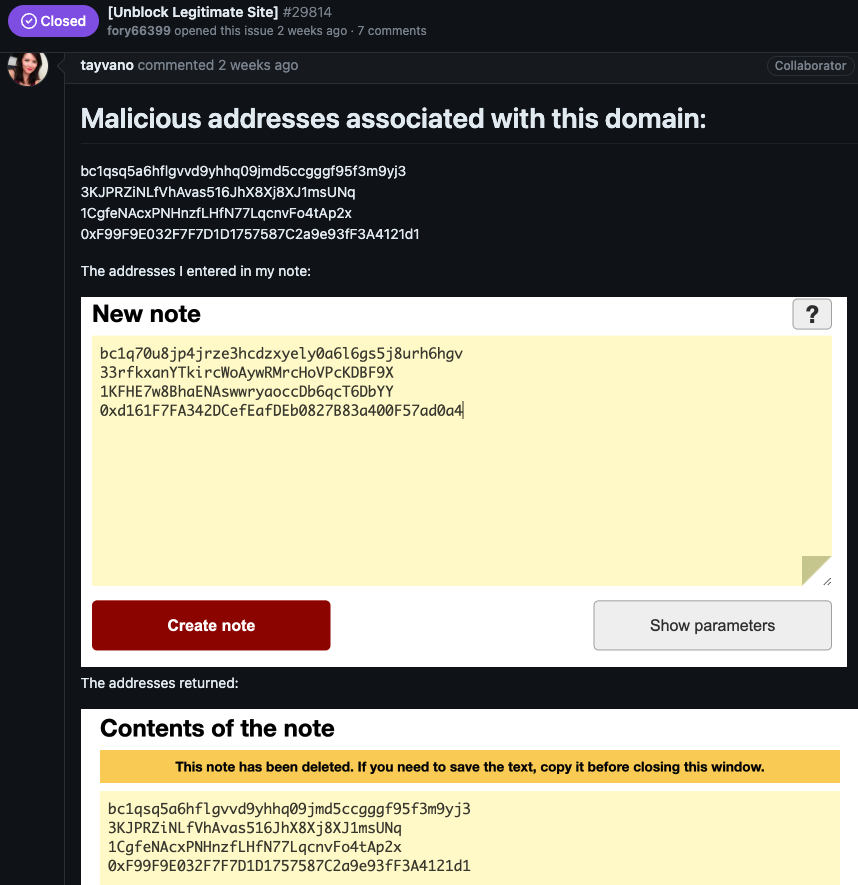
After being told where they could send a copy of their lawsuit, Fory66399 appeared to become flustered, and proceeded to mention a number of other interesting domain names:
You sent me screenshots from some other site! It’s red!!!!
The tornote.io website has a different color altogether
The privatenote,io website also has a different color! What’s wrong?????
A search at DomainTools.com for privatenote[.]io shows it has been registered to two names over as many years, including Andrey Sokol from Moscow and Alexandr Ermakov from Kiev. There is no indication these are the real names of the phishers, but the names are useful in pointing to other sites targeting Privnote since 2020.
DomainTools says other domains registered to Alexandr Ermakov include pirvnota[.]com, privatemessage[.]net, privatenote[.]io, and tornote[.]io.
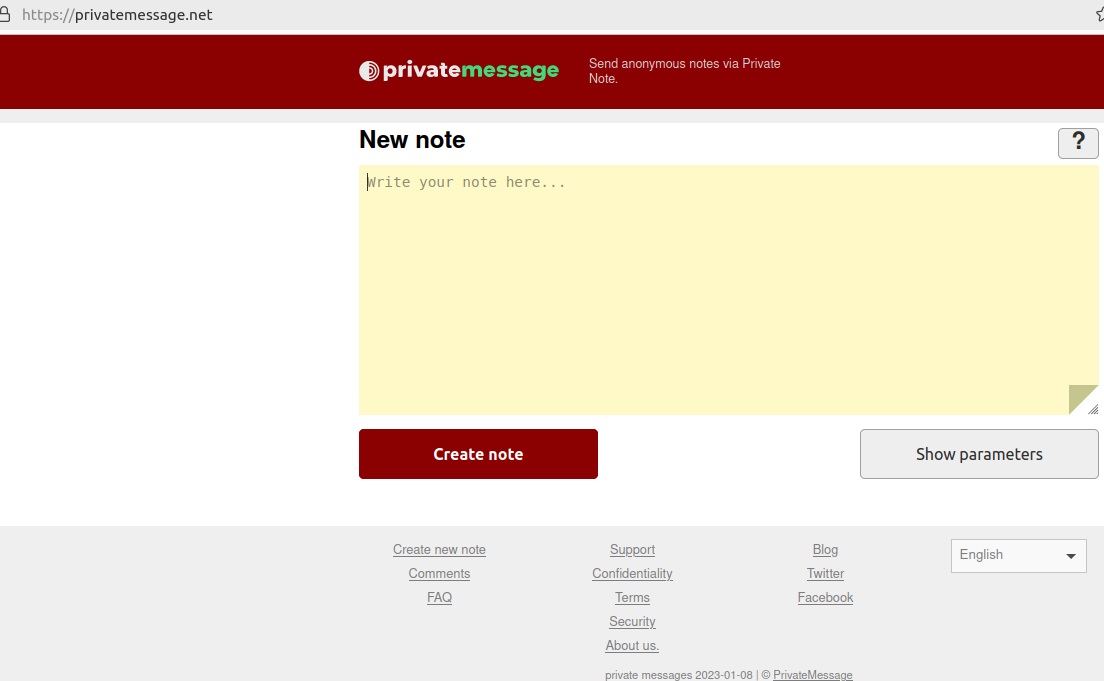
A screenshot of the phishing domain privatemessage dot net.
The registration records for pirvnota[.]com at one point were updated from Andrey Sokol to “BPW” as the registrant organization, and “Tambov district” in the registrant state/province field. Searching DomainTools for domains that include both of these terms reveals pirwnote[.]com.
Other Privnote phishing domains that also phoned home to the same Internet address as pirwnote[.]com include privnode[.]com, privnate[.]com, and prevnóte[.]com. Pirwnote[.]com is currently selling security cameras made by the Chinese manufacturer Hikvision, via an Internet address based in Hong Kong.
It appears someone has gone to great lengths to make tornote[.]io seem like a legitimate website. For example, this account at Medium has authored more than a dozen blog posts in the past year singing the praises of Tornote as a secure, self-destructing messaging service. However, testing shows tornote[.]io will also replace any cryptocurrency addresses in messages with their own payment address.
These malicious note sites attract visitors by gaming search engine results to make the phishing domains appear prominently in search results for “privnote.” A search in Google for “privnote” currently returns tornote[.]io as the fifth result. Like other phishing sites tied to this network, Tornote will use the same cryptocurrency addresses for roughly 5 days, and then rotate in new payment addresses.
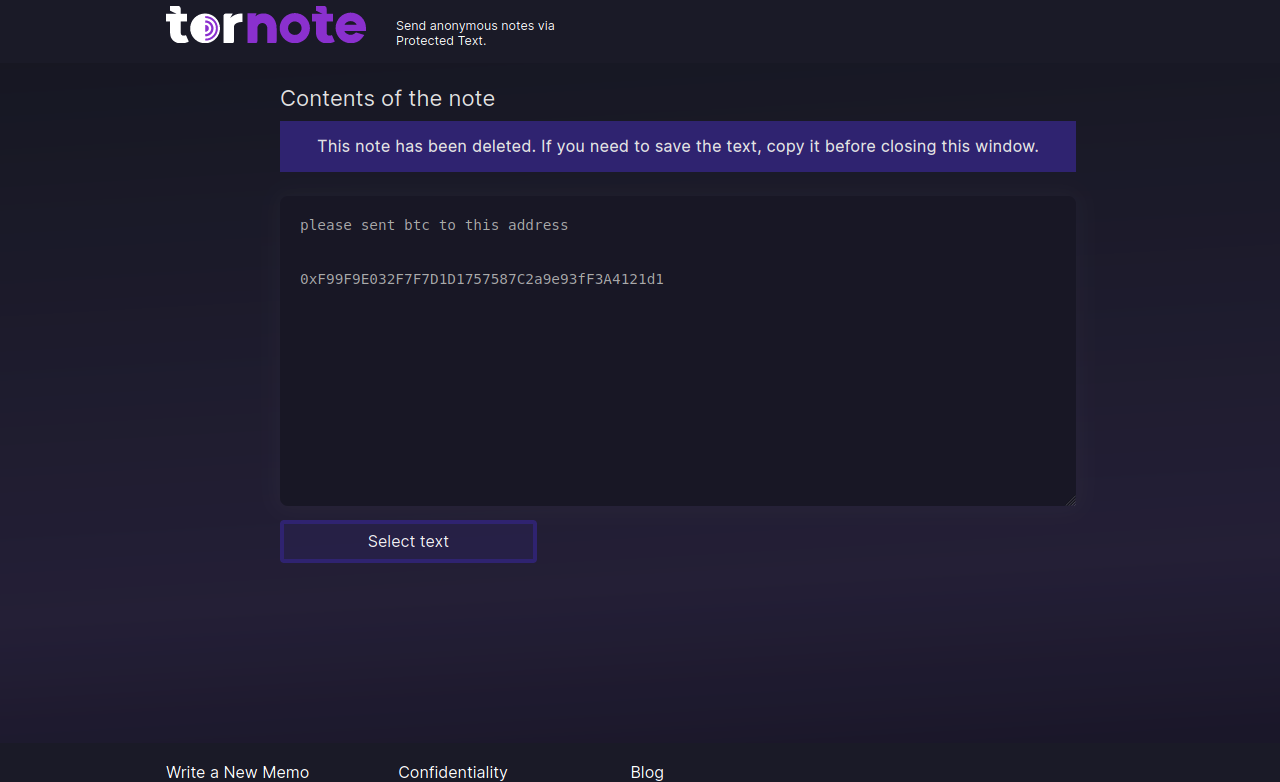
Tornote changed the cryptocurrency address entered into a test note to this address controlled by the phishers.
Throughout 2023, Tornote was hosted with the Russian provider DDoS-Guard, at the Internet address 186.2.163[.]216. A review of the passive DNS records tied to this address shows that apart from subdomains dedicated to tornote[.]io, the main other domain at this address was hkleaks[.]ml.
In August 2019, a slew of websites and social media channels dubbed “HKLEAKS” began doxing the identities and personal information of pro-democracy activists in Hong Kong. According to a report (PDF) from Citizen Lab, hkleaks[.]ml was the second domain that appeared as the perpetrators began to expand the list of those doxed.
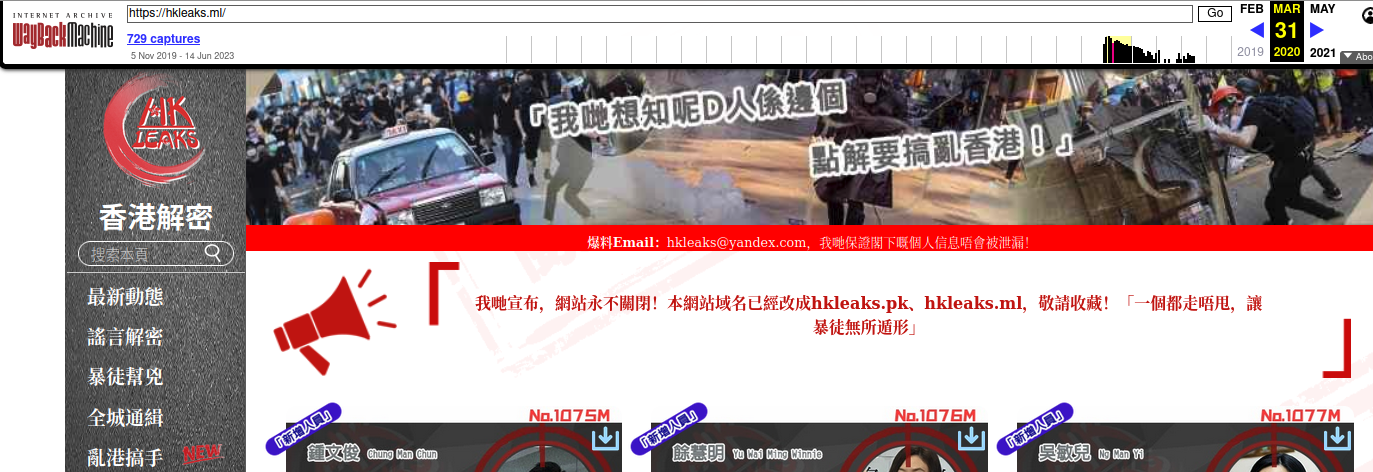
HKleaks, as indexed by The Wayback Machine.
DomainTools shows there are more than 1,000 other domains whose registration records include the organization name “BPW” and “Tambov District” as the location. Virtually all of those domains were registered through one of two registrars — Hong Kong-based Nicenic and Singapore-based WebCC — and almost all appear to be phishing or pill-spam related.
Among those is rustraitor[.]info, a website erected after Russia invaded Ukraine in early 2022 that doxed Russians perceived to have helped the Ukrainian cause.
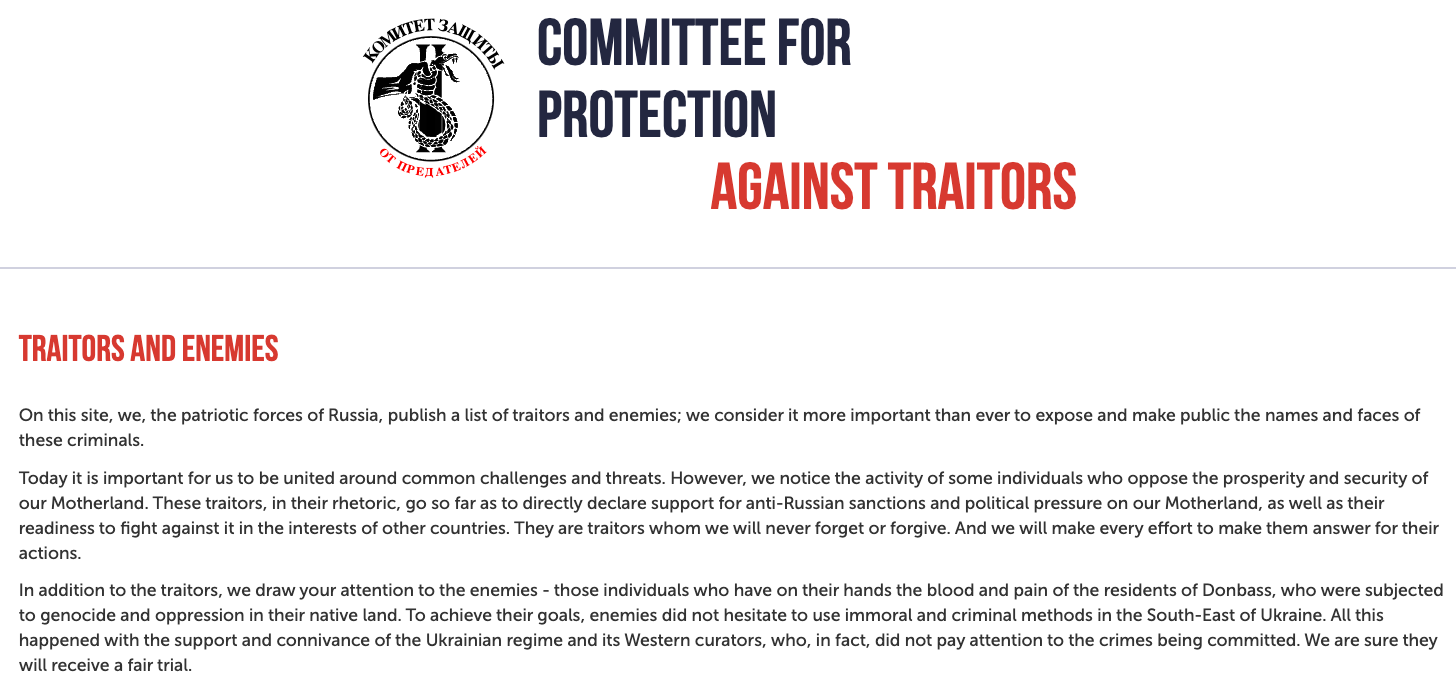
An archive.org copy of Rustraitor.
In keeping with the overall theme, these phishing domains appear focused on stealing usernames and passwords to some of the cybercrime underground’s busiest shops, including Brian’s Club. What do all the phished sites have in common? They all accept payment via virtual currencies.
It appears MetaMask’s Monahan made the correct decision in forcing these phishers to tip their hand: Among the websites at that DDoS-Guard address are multiple MetaMask phishing domains, including metarrnask[.]com, meternask[.]com, and rnetamask[.]com.
How profitable are these private note phishing sites? Reviewing the four malicious cryptocurrency payment addresses that the attackers swapped into notes passed through privnote[.]co (as pictured in Monahan’s screenshot above) shows that between March 15 and March 19, 2024, those address raked in and transferred out nearly $18,000 in cryptocurrencies. And that’s just one of their phishing websites.
In 2020, the United States brought charges against four men accused of building a bulletproof hosting empire that once dominated the Russian cybercrime industry and supported multiple organized cybercrime groups. All four pleaded guilty to conspiracy and racketeering charges. But there is a fascinating and untold backstory behind the two Russian men involved, who co-ran the world’s top spam forum and worked closely with Russia’s most dangerous cybercriminals.
From January 2005 to April 2013, there were two primary administrators of the cybercrime forum Spamdot (a.k.a Spamit), an invite-only community for Russian-speaking people in the businesses of sending spam and building botnets of infected computers to relay said spam. The Spamdot admins went by the nicknames Icamis (a.k.a. Ika), and Salomon (a.k.a. Sal).
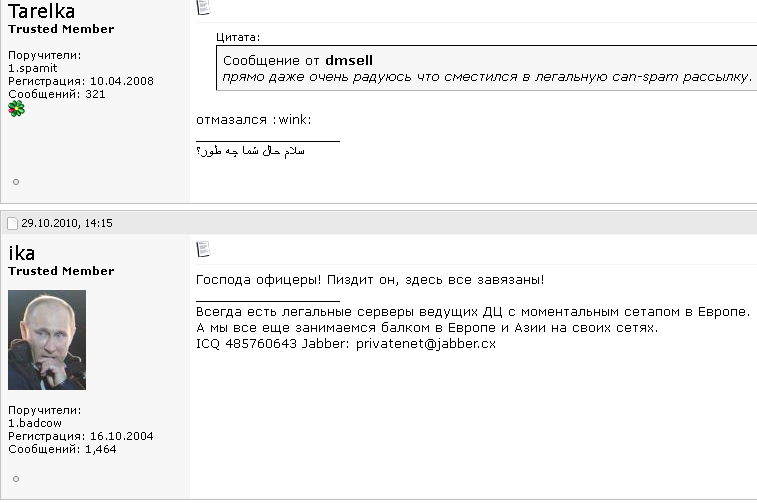
Spamdot forum administrator “Ika” a.k.a. “Icamis” responds to a message from “Tarelka,” the botmaster behind the Rustock botnet. Dmsell said: “I’m actually very glad that I switched to legal spam mailing,” prompting Tarelka and Ika to scoff.
As detailed in my 2014 book, Spam Nation, Spamdot was home to crooks controlling some of the world’s nastiest botnets, global malware contagions that went by exotic names like Rustock, Cutwail, Mega-D, Festi, Waledac, and Grum.
Icamis and Sal were in daily communications with these botmasters, via the Spamdot forum and private messages. Collectively in control over millions of spam-spewing zombies, those botmasters also continuously harvested passwords and other data from infected machines.
As we’ll see in a moment, Salomon is now behind bars, in part because he helped to rob dozens of small businesses in the United States using some of those same harvested passwords. He is currently housed in a federal prison in Michigan, serving the final stretch of a 60-month sentence.
But the identity and whereabouts of Icamis have remained a mystery to this author until recently. For years, security experts — and indeed, many top cybercriminals in the Spamit affiliate program — have expressed the belief that Sal and Icamis were likely the same person using two different identities. And there were many good reasons to support this conclusion.
For example, in 2010 Spamdot and its spam affiliate program Spamit were hacked, and its user database shows Sal and Icamis often accessed the forum from the same Internet address — usually from Cherepovets, an industrial town situated approximately 230 miles north of Moscow. Also, it was common for Icamis to reply when Spamdot members communicated a request or complaint to Sal, and vice versa.
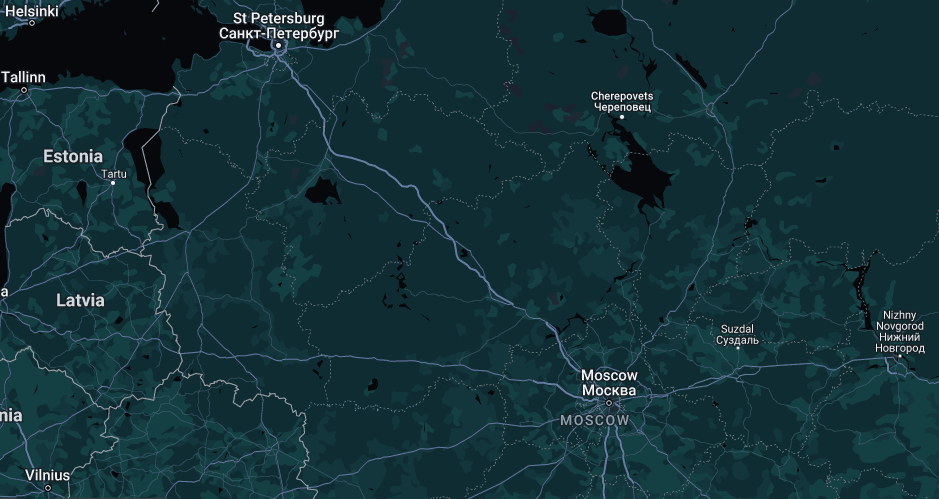
Image: maps.google.com
Still, other clues suggested Icamis and Sal were two separate individuals. For starters, they frequently changed the status on their instant messenger clients at different times. Also, they each privately discussed with others having attended different universities.
KrebsOnSecurity began researching Icamis’s real-life identity in 2012, but failed to revisit any of that research until recently. In December 2023, KrebsOnSecurity published new details about the identity of “Rescator,” a Russian cybercriminal who is thought to be closely connected to the 2013 data breach at Target.
That story mentioned Rescator’s real-life identity was exposed by Icamis in April 2013, as part of a lengthy farewell letter Ika wrote to Spamdot members wherein Ika said he was closing the forum and quitting the cybercrime business entirely.
To no one’s shock, Icamis didn’t quit the business: He simply became more quiet and circumspect about his work, which increasingly was focused on helping crime groups siphon funds from U.S. bank accounts. But the Rescator story was a reminder that 10 years worth of research on who Ika/Icamis is in real life had been completely set aside. This post is an attempt to remedy that omission.
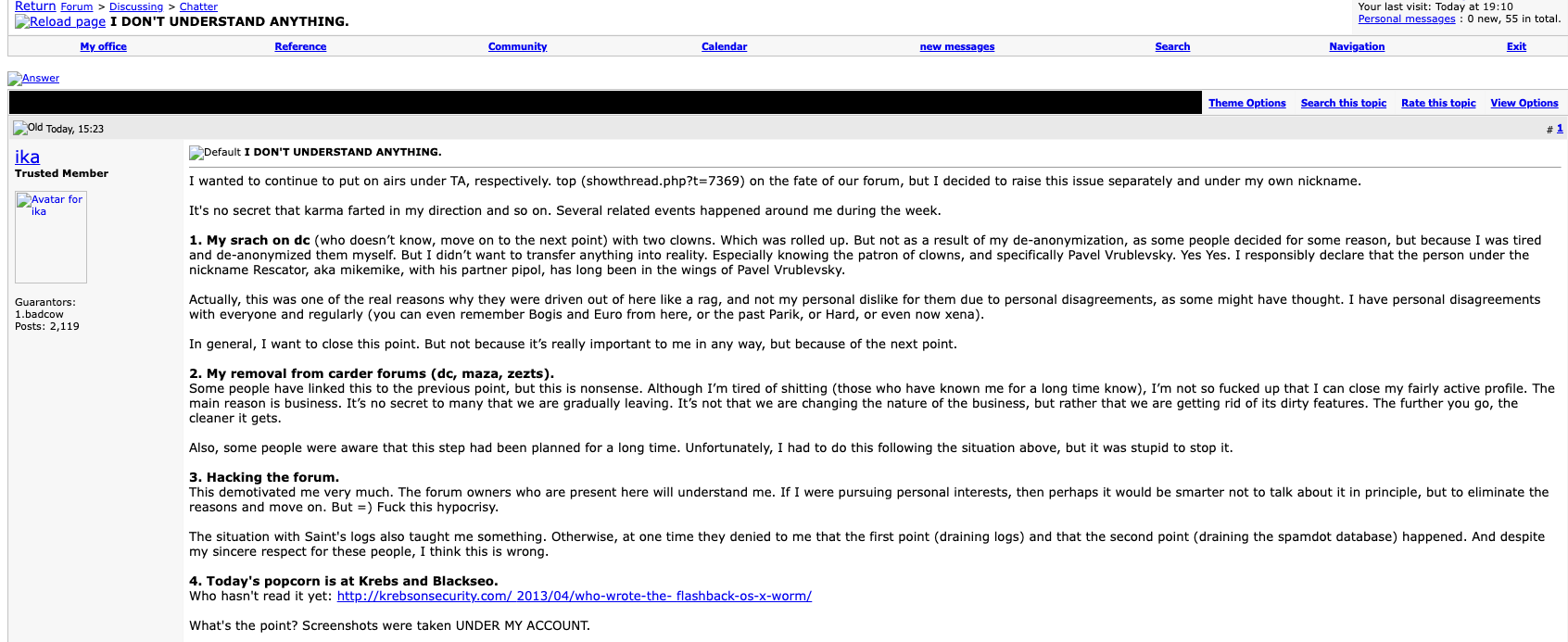
The farewell post from Ika (aka Icamis), the administrator of both the BlackSEO forum and Pustota, the successor forum to Spamit/Spamdot.
Icamis and Sal offered a comprehensive package of goods and services that any aspiring or accomplished spammer would need on a day-to-day basis: Virtually unlimited bulletproof domain registration and hosting services, as well as services that helped botmasters evade spam block lists generated by anti-spam groups like Spamhaus.org. Here’s snippet of Icamis’s ad on Spamdot from Aug. 2008, wherein he addresses forum members with the salutation, “Hello Gentlemen Scammers.”
We are glad to present you our services!
Many are already aware (and are our clients), but publicity is never superfluous.Domains.
– all major gtlds (com, net, org, info, biz)
– many interesting and uninteresting cctlds
– options for any topic
– processing of any quantities
– guarantees
– exceptionally low prices for domains for white and gray schemes (including any SEO and affiliate spam )
– control panel with balances and auto-registration
– all services under the Ikamis brand, proven over the years;)Servers.
– long-term partnerships with several [data centers] in several parts of the world for any topic
– your own data center (no longer in Russia ;)) for gray and white topics
– any configuration and any hardware
– your own IP networks (PI, not PA) and full legal support
– realtime backups to neutral sites
– guarantees and full responsibility for the services provided
– non-standard equipment on request
– our own admins to resolve any technical issues (services are free for clients)
– hosting (shared and vps) is also possibleNon-standard and related services.
– ssl certificates signed by geotrust and thawte
– old domains (any year, any quantity)
– beautiful domains (keyword, short, etc.)
– domains with indicators (any, for SEO, etc.)
– making unstable gtld domains stable
– interception and hijacking of custom domains (expensive)
– full domain posting via web.archive.org with restoration of native content (preliminary applications)
– any updates to our panels to suit your needs upon request (our own coders)All orders for the “Domains” sections and “Servers” are carried out during the day (depending on our workload).
For non-standard and related services, a preliminary application is required 30 days in advance (except for ssl certificates – within 24 hours).
Icamis and Sal frequently claimed that their service kept Spamhaus and other anti-spam groups several steps behind their operations. But it’s clear that those anti-spam operations had a real and painful impact on spam revenues, and Salomon was obsessed with striking back at anti-spam groups, particularly Spamhaus.
In 2007, Salomon collected more than $3,000 from botmasters affiliated with competing spam affiliate programs that wanted to see Spamhaus suffer, and the money was used to fund a week-long distributed denial-of-service (DDoS) attack against Spamhaus and its online infrastructure. But rather than divert their spam botnets from their normal activity and thereby decrease sales, the botmasters voted to create a new DDoS botnet by purchasing installations of DDoS malware on thousands of already-hacked PCs (at a rate of $25 per 1,000 installs).
As an affiliate of Spamdot, Salomon used the email address ad1@safe-mail.net, and the password 19871987gr. The breach tracking service Constella Intelligence found the password 19871987gr was used by the email address grichishkin@gmail.com. Multiple accounts are registered to that email address under the name Alexander Valerievich Grichishkin, from Cherepovets.
In 2020, Grichishkin was arrested outside of Russia on a warrant for providing bulletproof hosting services to cybercriminal gangs. The U.S. government said Grichishkin and three others set up the infrastructure used by cybercriminals between 2009 to 2015 to distribute malware and attack financial institutions and victims throughout the United States.
Those clients included crooks using malware like Zeus, SpyEye, Citadel and the Blackhole exploit kit to build botnets and steal banking credentials.
“The Organization and its members helped their clients to access computers without authorization, steal financial information (including banking credentials), and initiate unauthorized wire transfers from victims’ financial accounts,” the government’s complaint stated.
Grichishkin pleaded guilty to conspiracy charges and was sentenced to four years in prison. He is 36 years old, has a wife and kids in Thailand, and is slated for release on February 8, 2024.
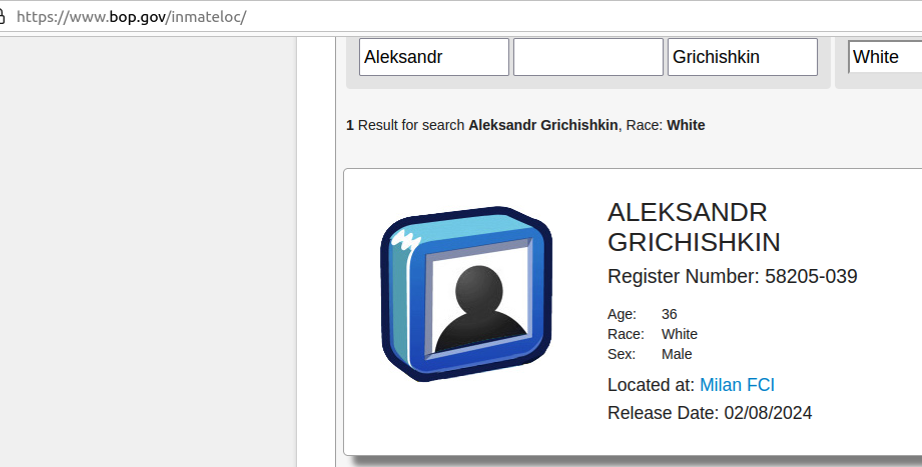
The identity of Icamis came into view when KrebsOnSecurity began focusing on clues that might connect Icamis to Cherepovets (Ika’s apparent hometown based on the Internet addresses he regularly used to access Spamdot).
Historic domain ownership records from DomainTools.com reveal that many of the email addresses and domains connected to Icamis invoke the name “Andrew Artz,” including icamis[.]ws, icamis[.]ru, and icamis[.]biz. Icamis promoted his services in 2003 — such as bulk-domains[.]info — using the email address icamis@4host.info. From one of his ads in 2005:
Domains For Projects Advertised By Spam
I can register bulletproof domains for sites and projects advertised by spam(of course they must be legal). I can not provide DNS for u, only domains. The price will be:
65$ for domain[if u will buy less than 5 domains]
50$ for domain[more than 5 domains]
45$ for domain[more than 10 domains]
These prices are for domains in the .net & .com zones.
If u want to order domains write me to: icamis@4host.info
In 2009, an “Andrew Artz” registered at the hosting service FirstVDS.com using the email address icamis@4host.info, with a notation saying the company name attached to the account was “WMPay.” Likewise, the bulletproof domain service icamis[.]ws was registered to an Andrew Artz.
The domain wmpay.ru is registered to the phonetically similar name “Andrew Hertz,” at andrew@wmpay.ru. A search on “icamis.ru” in Google brings up a 2003 post by him on a discussion forum designed by and for students of Amtek, a secondary school in Cherepovets (Icamis was commenting from an Internet address in Cherepovets).

The website amtek-foreva-narod.ru is still online, and it links to several yearbooks for Amtek graduates. It states that the yearbook for the Amtek class of 2004 is hosted at 41.wmpay[.]com.
The yearbook photos for the Amtek class of 2004 are not indexed in the Wayback Machine at archive.org, but the names and nicknames of 16 students remain. However, it appears that the entry for one student — the Wmpay[.]com site administrator — was removed at some point.
In 2004, the administrator of the Amtek discussion forum — a 2003 graduate who used the handle “Grand” — observed that there were three people named Andrey who graduated from Amtek in 2004, but one of them was conspicuously absent from the yearbook at wmpay[.]ru: Andrey Skvortsov.

To bring this full circle, Icamis was Andrey Skvortsov, the other Russian man charged alongside Grichiskin (the two others who pleaded guilty to conspiracy charges were from Estonia and Lithuania). All of the defendants in that case pleaded guilty to conspiracy to engage in a Racketeer Influenced Corrupt Organization (RICO).
[Author’s note: No doubt government prosecutors had their own reasons for omitting the nicknames of the defendants in their press releases, but that information sure would have saved me a lot of time and effort].
Skvortsov was sentenced to time served, and presumably deported. His current whereabouts are unknown and he was not reachable for comment via his known contact addresses.
The government says Ika and Sal’s bulletproof hosting empire provided extensive support for a highly damaging cybercrime group known as the JabberZeus Crew, which worked closely with the author of the Zeus Trojan — Evgeniy Mikhailovich Bogachev — to develop a then-advanced strain of the Zeus malware that was designed to defeat one-time codes for authentication. Bogachev is a top Russian cybercriminal with a standing $3 million bounty on his head from the FBI.
The JabberZeus Crew stole money by constantly recruiting money mules, people in the United States and in Europe who could be enticed or tricked into forwarding money stolen from cybercrime victims. Interestingly, Icamis’s various email addresses are connected to websites for a vast network of phony technology companies that claimed they needed people with bank accounts to help pay their overseas employees.
Icamis used the email address tech@safe-mail.net on Spamdot, and this email address is tied to the registration records for multiple phony technology companies that were set up to recruit money mules.
One such site — sun-technology[.]net — advertised itself as a Hong Kong-based electronics firm that was looking for “honest, responsible and motivated people in UK, USA, AU and NZ to be Sales Representatives in your particular region and receive payments from our clients. Agent commission is 5 percent of total amount received to the personal bank account. You may use your existing bank account or open a new one for these purposes.”
In January 2010, KrebsOnSecurity broke the news that the JabberZeus crew had just used money mules to steal $500,000 from tiny Duanesburg Central School District in upstate New York. As part of his sentence, Skvortsov was ordered to pay $497,200 in restitution to the Duanesburg Central School District.
The JabberZeus Crew operated mainly out of the eastern Ukraine city of Donetsk, which was always pro-Russia and is now occupied by Russian forces. But when Russia invaded Ukraine in February 2022, the alleged leader of the notorious cybercrime gang — Vyacheslav Igoravich Andreev (a.ka. Penchukov) — fled his mandatory military service orders and was arrested in Geneva, Switzerland. He is currently in federal custody awaiting trial, and is slated to be arraigned in U.S. federal court tomorrow (Jan. 9, 2024). A copy of the indictment against Andreev is here (PDF).

Andreev, aka “Tank,” seen here performing as a DJ in Ukraine in an undated photo from social media.